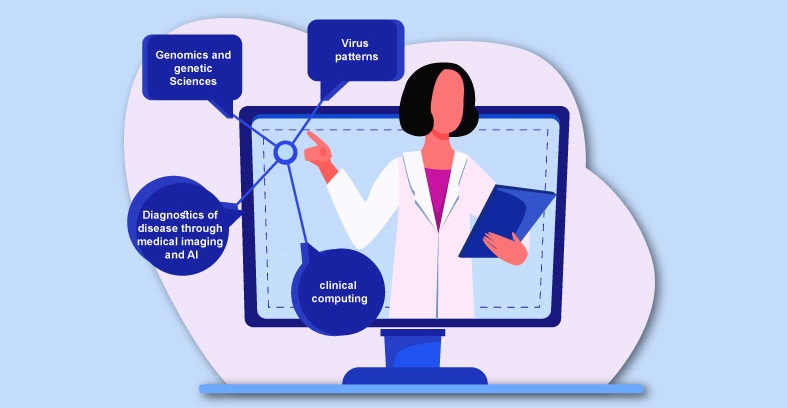Students doing Freelancing: Department is producing freelancers for the IT industry during their studies. List of our present Freelancers
Mission Statement
Prepare future Computer Scientists to achieve excellence in the core competencies of computer science that enable them to effectively develop software solutions for challenges faced in industry and research with the highest level of integrity.
Accreditation of BSCS from HEC
Accreditation from National Computing Education Accreditation Council (NCEAC).
-
Category/Rating X for two years (2011‐2012)
-
Category/Rating W for three years (2013‐2015)
Zero Visit Accreditation from HEC for BS Artificial Intelligence and Software Engineering in Progress.
Good News for Intermediate and Equivalent Pre-Medical Students
All bachelor’s Programs of the Department of Computer Science are offered for FSC Pre-Medical students.
The National Computing Education & Accreditation Council (NCEAC) of HEC has approved the admissions in Computing programs for those students who have done intermediate education (FSC or equivalent) in Pre-Medical with a minimum of 50% marks. These students are required to pass deficiency courses of Mathematics of 6 credit hours within 1 year of their regular studies. The deficiency courses should cover most of the relevant topics to a Bachelor’s Degree in computing education from the intermediate level of Mathematics.
We congratulate the students who have done intermediate education (FSC or equivalent) in Pre-Medical with the minimum of 50% marks that they can now take admitted in Bachelor of Science in Computer Science/ Software Engineering /Artificial Intelligence programs at SS-CASE-IT. No need to appear in Board intermediate level (FSC or equivalent) exams to clear their mathematics courses. You can directly take admission to computing programs. These students don’t need to appear in Board intermediate level (FSC or equivalent) exams to clear their mathematics courses. The two mathematics courses taught in the first semester will make them eligible to continue their education in computing courses from Fall 2020 semester as per HEC directives thus saving their time.
Career Benefits for Pre-Medical Students in Computing Programs
Students with Pre-Medical backgrounds have a large no of career possibilities in computing.
-
Main Stream Computing: This includes Artificial Intelligence Engineer, Cyber Security Analysts, Database Administrators, Data Science Analysts, System Administrators, Game Developers, etc.
-
Biomedical Computing: These students can also explore their careers in Diagnostics of disease through Medical Imaging and Artificial Intelligence, Genomics and Genetics Sciences, Laboratory Computing, Hospital Information Systems, Computer Assisted Therapy, Virus Patterns like the Corona family of viruses, Clinical Computing, Bioinformatic Systems, etc.
Options for Pre-Medical students
Pre-Medical students don’t need to appear in Board intermediate level (FSC or equivalent) exams to clear their mathematics courses. The two mathematics courses taught in the first semester will make them eligible to continue their education in computing courses from Fall 2020 semester as per HEC directives thus saving their time. Below are the options for Pre-Medical students

Future Growth Trends
In-demand Computing Graduates can earn up to Rs. 300k/month with global growth in IT Industry estimated at 3.7% annually.
Students with Pre-Medical backgrounds don’t need to appear in Board intermediate level (FSC or equivalent) exams to clear their mathematics courses.
Program Learning Outcomes (PLOs)
- Academic Education: To prepare graduates as computing professionals.
-
Knowledge for Solving Computing Problems: Apply knowledge of computing fundamentals, knowledge of a computing specialization, and mathematics, science, and domain knowledge appropriate for the computing specialization to the 16 abstractions and conceptualization of computing models from defined problems and requirements.
-
Problem Analysis: Identity, formulate, research literature, and solve complex computing problems reaching substantiated conclusions using fundamental principles of mathematics, computing sciences, and relevant domain disciplines.
-
Design/ Development of Solutions: Design and evaluate solutions for complex computing problems, and design and evaluate systems, components, or processes that meet specified needs with appropriate consideration for public health and safety, cultural, societal, and environmental considerations.
-
Modern Tool Usage: Create, select, adapt, and apply appropriate techniques, resources, and modern computing tools to complex computing activities, with an understanding of the limitations.
-
Individual and Team Work: Function effectively as an individual and as a member or leader in diverse teams and in multi‐disciplinary settings.
-
Communication: Communicate effectively with the computing community and with society at large about complex computing activities by being able to comprehend and write effective reports, design documentation, make effective presentations, and give and understand clear instructions.
-
Computing Professionalism and Society: Understand and assess societal, health, safety, legal, and cultural issues within local and global contexts, and the consequential responsibilities relevant to professional computing practice.
-
Ethics: Understand and commit to professional ethics, responsibilities, and norms of professional computing practice.
-
Life‐long Learning: Recognize the need, and have the ability, to engage in independent learning for continual development as a computing professional.
Bachelor's Graduates
Master's Graduates
PhD Graduates
Awards
 Dr. Abdul Khaliq
Dr. Abdul Khaliq
Dean’s Message
It is with great pleasure I want to congratulate everyone that CASE is now a degree-awarding institute under the Federal Government Act of Majlis-e-Shoora (Parliament) No. F.9(26)/2018-Legis dated May 22, 2018. As per the new act, CASE has transformed into Sir Syed CASE Institute of Technology (SS CASE IT).
We have moved to our newly constructed custom-built campus located at Block A, Multi Garden, Sector B-17, Islamabad since November 19, 2018. A historic date indeed!!
Faculty of Engineering is running five programs at Bachelor, Master, and PhD levels in the area of Electrical Engineering, Computer Engineering, Software Engineering, and Computer Science. We have already graduated more than +2000 students who have already taken important positions in various national and multinational organizations.
I am extremely confident in the future of engineering and computer sciences education and research at the SS CASE IT. The institute has strong leadership in place, remarkable faculty, an excellent student base, and an amazing group of supporters in you, our alumni. We will continue to provide quality research and educational experience to equip the next generation of Top notch brilliant Engineers and Computer Scientists.
I welcome you to be part of this faculty.


